Business Management: Unit 9 Entrepreneurship and Small Business
VerifiedAdded on 2023/01/04
|16
|4494
|53
Report
AI Summary
This report delves into the realm of entrepreneurship and small business management. It begins by analyzing various types of entrepreneurial ventures, their interconnections, and the typologies of entrepreneurship. The report then explores the similarities and differences between these ventures. A significant portion is dedicated to interpreting and assessing relevant data and statistics to illustrate the impact of micro and small businesses on the economy, as well as the significance of small businesses and start-ups for the growth of the social economy. Furthermore, the report identifies the characteristics, traits, and skills of successful entrepreneurs, differentiating them from other business managers, and assesses how entrepreneurial personality aspects reflect motivations and mindsets. Finally, it examines various environments that either foster or hinder entrepreneurship, providing a comprehensive overview of the subject.

Unit 9 Entrepreneurship and
Small Business Management
Small Business Management
Paraphrase This Document
Need a fresh take? Get an instant paraphrase of this document with our AI Paraphraser
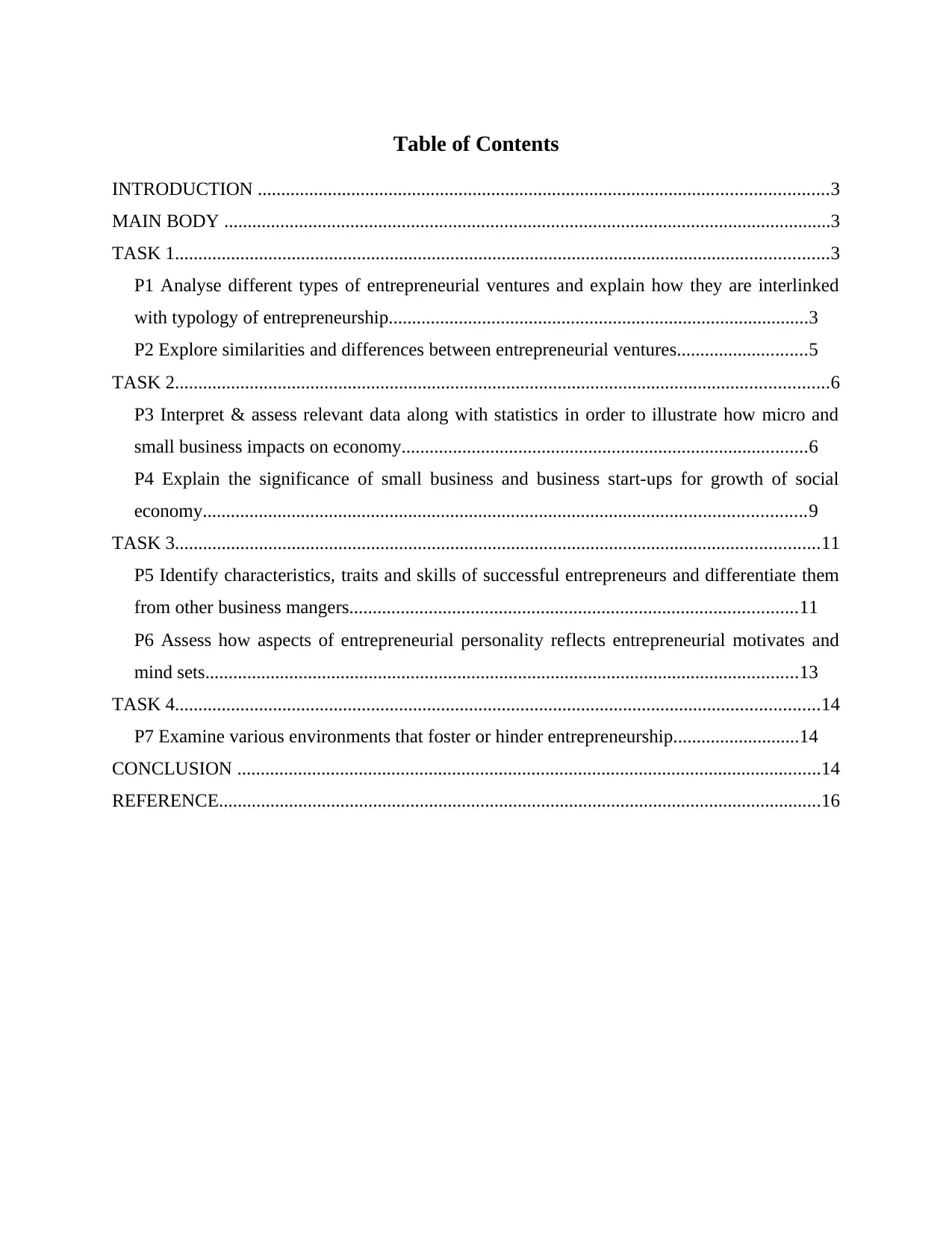
Table of Contents
INTRODUCTION ..........................................................................................................................3
MAIN BODY ..................................................................................................................................3
TASK 1............................................................................................................................................3
P1 Analyse different types of entrepreneurial ventures and explain how they are interlinked
with typology of entrepreneurship..........................................................................................3
P2 Explore similarities and differences between entrepreneurial ventures............................5
TASK 2............................................................................................................................................6
P3 Interpret & assess relevant data along with statistics in order to illustrate how micro and
small business impacts on economy.......................................................................................6
P4 Explain the significance of small business and business start-ups for growth of social
economy.................................................................................................................................9
TASK 3..........................................................................................................................................11
P5 Identify characteristics, traits and skills of successful entrepreneurs and differentiate them
from other business mangers................................................................................................11
P6 Assess how aspects of entrepreneurial personality reflects entrepreneurial motivates and
mind sets...............................................................................................................................13
TASK 4..........................................................................................................................................14
P7 Examine various environments that foster or hinder entrepreneurship...........................14
CONCLUSION .............................................................................................................................14
REFERENCE.................................................................................................................................16
INTRODUCTION ..........................................................................................................................3
MAIN BODY ..................................................................................................................................3
TASK 1............................................................................................................................................3
P1 Analyse different types of entrepreneurial ventures and explain how they are interlinked
with typology of entrepreneurship..........................................................................................3
P2 Explore similarities and differences between entrepreneurial ventures............................5
TASK 2............................................................................................................................................6
P3 Interpret & assess relevant data along with statistics in order to illustrate how micro and
small business impacts on economy.......................................................................................6
P4 Explain the significance of small business and business start-ups for growth of social
economy.................................................................................................................................9
TASK 3..........................................................................................................................................11
P5 Identify characteristics, traits and skills of successful entrepreneurs and differentiate them
from other business mangers................................................................................................11
P6 Assess how aspects of entrepreneurial personality reflects entrepreneurial motivates and
mind sets...............................................................................................................................13
TASK 4..........................................................................................................................................14
P7 Examine various environments that foster or hinder entrepreneurship...........................14
CONCLUSION .............................................................................................................................14
REFERENCE.................................................................................................................................16
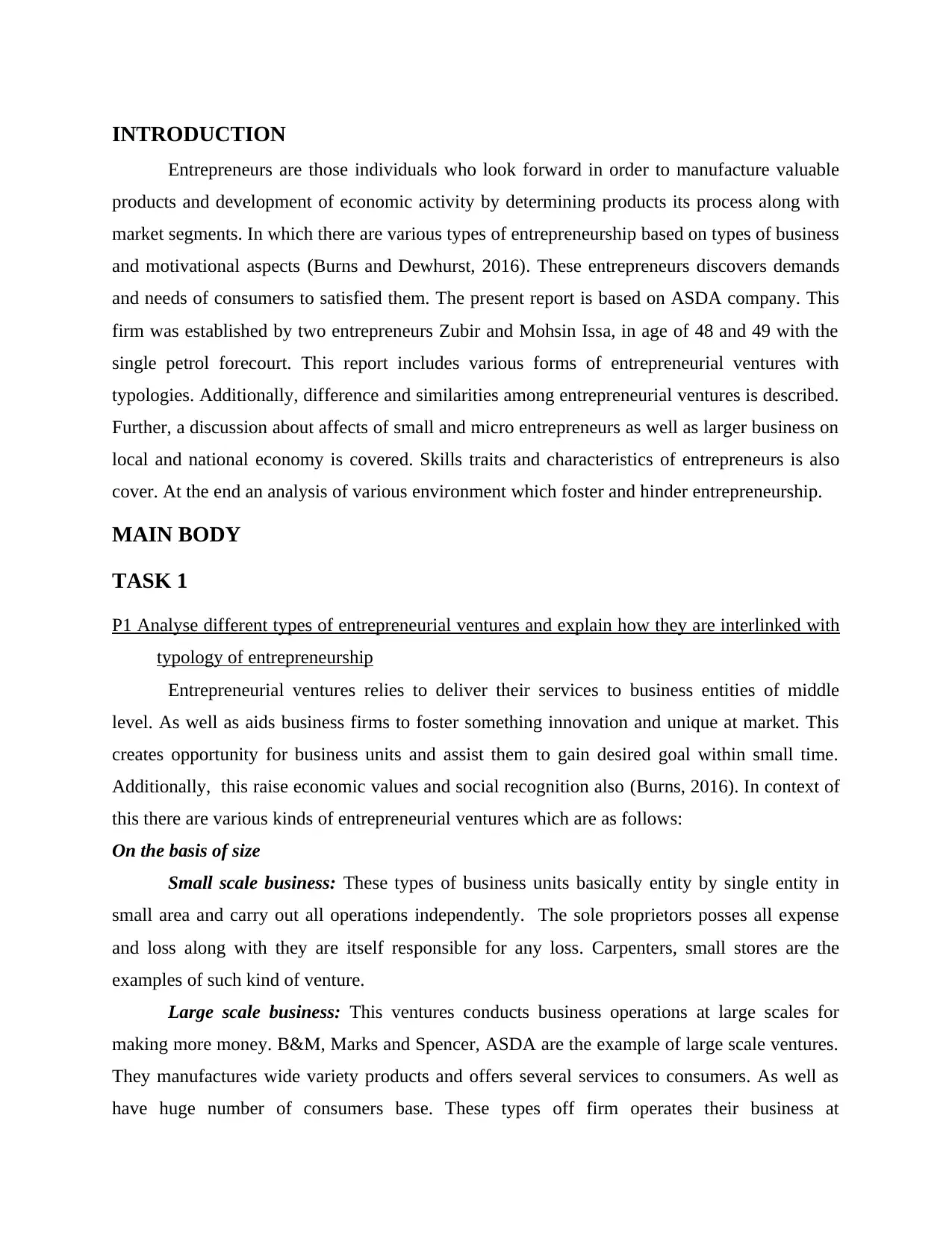
INTRODUCTION
Entrepreneurs are those individuals who look forward in order to manufacture valuable
products and development of economic activity by determining products its process along with
market segments. In which there are various types of entrepreneurship based on types of business
and motivational aspects (Burns and Dewhurst, 2016). These entrepreneurs discovers demands
and needs of consumers to satisfied them. The present report is based on ASDA company. This
firm was established by two entrepreneurs Zubir and Mohsin Issa, in age of 48 and 49 with the
single petrol forecourt. This report includes various forms of entrepreneurial ventures with
typologies. Additionally, difference and similarities among entrepreneurial ventures is described.
Further, a discussion about affects of small and micro entrepreneurs as well as larger business on
local and national economy is covered. Skills traits and characteristics of entrepreneurs is also
cover. At the end an analysis of various environment which foster and hinder entrepreneurship.
MAIN BODY
TASK 1
P1 Analyse different types of entrepreneurial ventures and explain how they are interlinked with
typology of entrepreneurship
Entrepreneurial ventures relies to deliver their services to business entities of middle
level. As well as aids business firms to foster something innovation and unique at market. This
creates opportunity for business units and assist them to gain desired goal within small time.
Additionally, this raise economic values and social recognition also (Burns, 2016). In context of
this there are various kinds of entrepreneurial ventures which are as follows:
On the basis of size
Small scale business: These types of business units basically entity by single entity in
small area and carry out all operations independently. The sole proprietors posses all expense
and loss along with they are itself responsible for any loss. Carpenters, small stores are the
examples of such kind of venture.
Large scale business: This ventures conducts business operations at large scales for
making more money. B&M, Marks and Spencer, ASDA are the example of large scale ventures.
They manufactures wide variety products and offers several services to consumers. As well as
have huge number of consumers base. These types off firm operates their business at
Entrepreneurs are those individuals who look forward in order to manufacture valuable
products and development of economic activity by determining products its process along with
market segments. In which there are various types of entrepreneurship based on types of business
and motivational aspects (Burns and Dewhurst, 2016). These entrepreneurs discovers demands
and needs of consumers to satisfied them. The present report is based on ASDA company. This
firm was established by two entrepreneurs Zubir and Mohsin Issa, in age of 48 and 49 with the
single petrol forecourt. This report includes various forms of entrepreneurial ventures with
typologies. Additionally, difference and similarities among entrepreneurial ventures is described.
Further, a discussion about affects of small and micro entrepreneurs as well as larger business on
local and national economy is covered. Skills traits and characteristics of entrepreneurs is also
cover. At the end an analysis of various environment which foster and hinder entrepreneurship.
MAIN BODY
TASK 1
P1 Analyse different types of entrepreneurial ventures and explain how they are interlinked with
typology of entrepreneurship
Entrepreneurial ventures relies to deliver their services to business entities of middle
level. As well as aids business firms to foster something innovation and unique at market. This
creates opportunity for business units and assist them to gain desired goal within small time.
Additionally, this raise economic values and social recognition also (Burns, 2016). In context of
this there are various kinds of entrepreneurial ventures which are as follows:
On the basis of size
Small scale business: These types of business units basically entity by single entity in
small area and carry out all operations independently. The sole proprietors posses all expense
and loss along with they are itself responsible for any loss. Carpenters, small stores are the
examples of such kind of venture.
Large scale business: This ventures conducts business operations at large scales for
making more money. B&M, Marks and Spencer, ASDA are the example of large scale ventures.
They manufactures wide variety products and offers several services to consumers. As well as
have huge number of consumers base. These types off firm operates their business at
⊘ This is a preview!⊘
Do you want full access?
Subscribe today to unlock all pages.

Trusted by 1+ million students worldwide
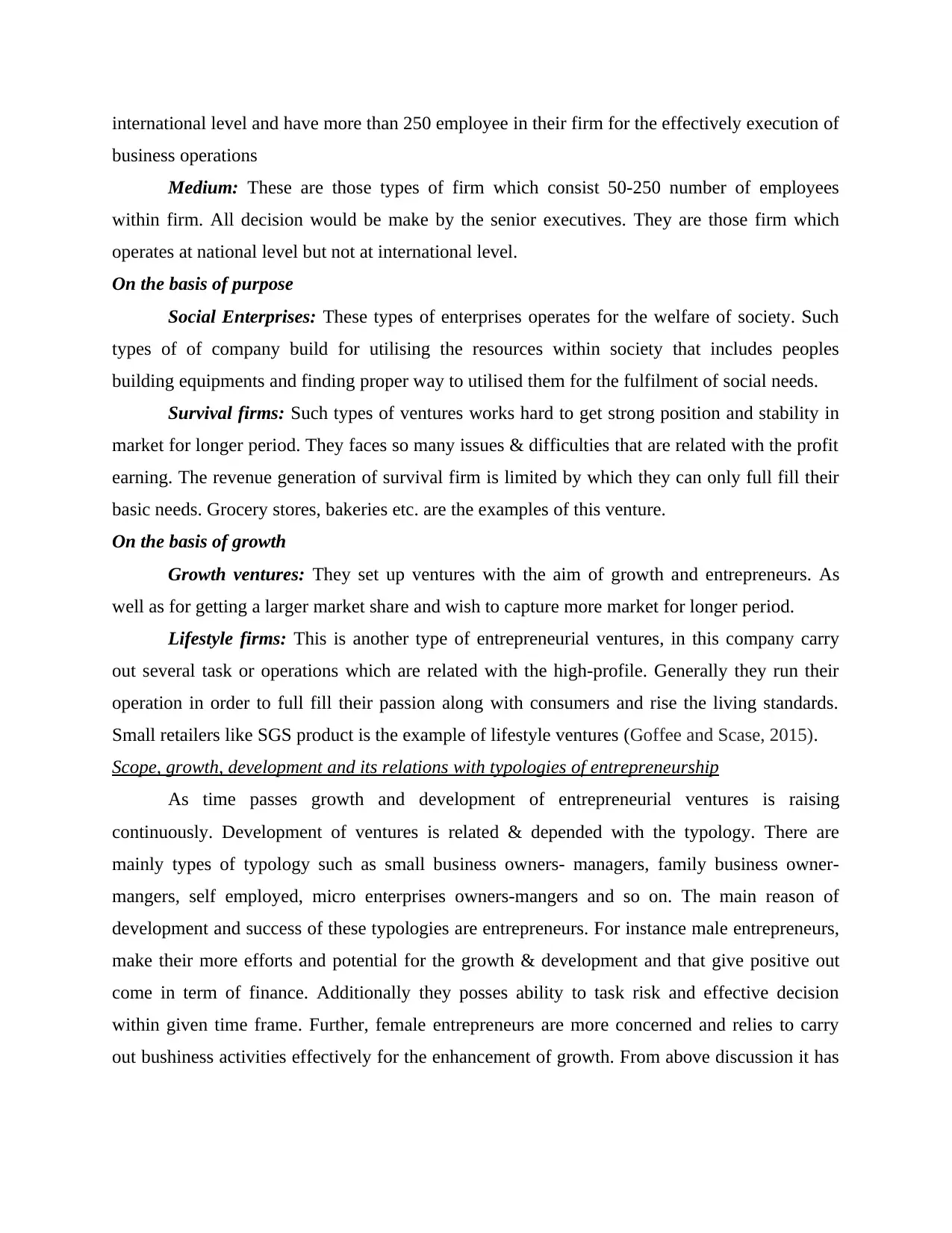
international level and have more than 250 employee in their firm for the effectively execution of
business operations
Medium: These are those types of firm which consist 50-250 number of employees
within firm. All decision would be make by the senior executives. They are those firm which
operates at national level but not at international level.
On the basis of purpose
Social Enterprises: These types of enterprises operates for the welfare of society. Such
types of of company build for utilising the resources within society that includes peoples
building equipments and finding proper way to utilised them for the fulfilment of social needs.
Survival firms: Such types of ventures works hard to get strong position and stability in
market for longer period. They faces so many issues & difficulties that are related with the profit
earning. The revenue generation of survival firm is limited by which they can only full fill their
basic needs. Grocery stores, bakeries etc. are the examples of this venture.
On the basis of growth
Growth ventures: They set up ventures with the aim of growth and entrepreneurs. As
well as for getting a larger market share and wish to capture more market for longer period.
Lifestyle firms: This is another type of entrepreneurial ventures, in this company carry
out several task or operations which are related with the high-profile. Generally they run their
operation in order to full fill their passion along with consumers and rise the living standards.
Small retailers like SGS product is the example of lifestyle ventures (Goffee and Scase, 2015).
Scope, growth, development and its relations with typologies of entrepreneurship
As time passes growth and development of entrepreneurial ventures is raising
continuously. Development of ventures is related & depended with the typology. There are
mainly types of typology such as small business owners- managers, family business owner-
mangers, self employed, micro enterprises owners-mangers and so on. The main reason of
development and success of these typologies are entrepreneurs. For instance male entrepreneurs,
make their more efforts and potential for the growth & development and that give positive out
come in term of finance. Additionally they posses ability to task risk and effective decision
within given time frame. Further, female entrepreneurs are more concerned and relies to carry
out bushiness activities effectively for the enhancement of growth. From above discussion it has
business operations
Medium: These are those types of firm which consist 50-250 number of employees
within firm. All decision would be make by the senior executives. They are those firm which
operates at national level but not at international level.
On the basis of purpose
Social Enterprises: These types of enterprises operates for the welfare of society. Such
types of of company build for utilising the resources within society that includes peoples
building equipments and finding proper way to utilised them for the fulfilment of social needs.
Survival firms: Such types of ventures works hard to get strong position and stability in
market for longer period. They faces so many issues & difficulties that are related with the profit
earning. The revenue generation of survival firm is limited by which they can only full fill their
basic needs. Grocery stores, bakeries etc. are the examples of this venture.
On the basis of growth
Growth ventures: They set up ventures with the aim of growth and entrepreneurs. As
well as for getting a larger market share and wish to capture more market for longer period.
Lifestyle firms: This is another type of entrepreneurial ventures, in this company carry
out several task or operations which are related with the high-profile. Generally they run their
operation in order to full fill their passion along with consumers and rise the living standards.
Small retailers like SGS product is the example of lifestyle ventures (Goffee and Scase, 2015).
Scope, growth, development and its relations with typologies of entrepreneurship
As time passes growth and development of entrepreneurial ventures is raising
continuously. Development of ventures is related & depended with the typology. There are
mainly types of typology such as small business owners- managers, family business owner-
mangers, self employed, micro enterprises owners-mangers and so on. The main reason of
development and success of these typologies are entrepreneurs. For instance male entrepreneurs,
make their more efforts and potential for the growth & development and that give positive out
come in term of finance. Additionally they posses ability to task risk and effective decision
within given time frame. Further, female entrepreneurs are more concerned and relies to carry
out bushiness activities effectively for the enhancement of growth. From above discussion it has
Paraphrase This Document
Need a fresh take? Get an instant paraphrase of this document with our AI Paraphraser
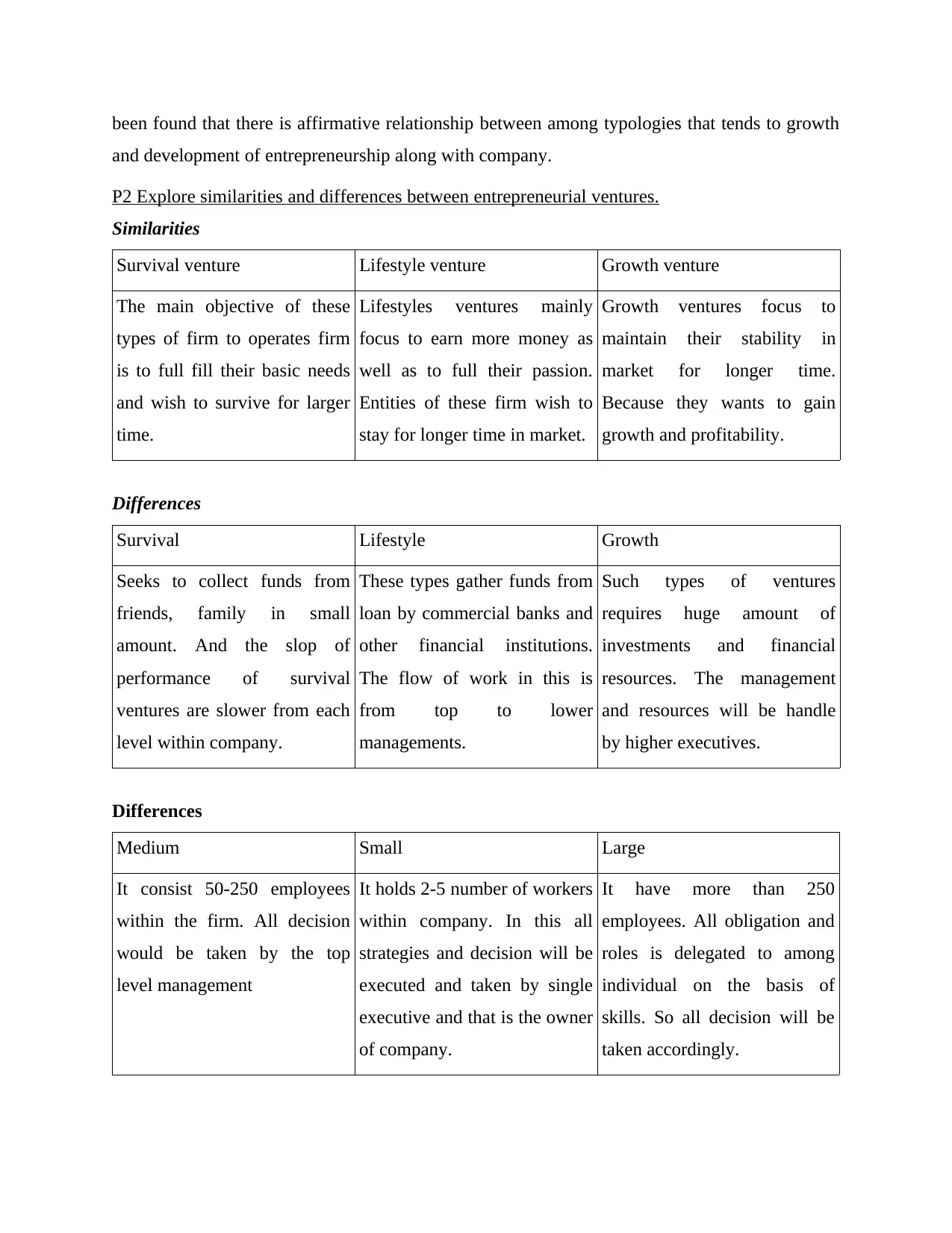
been found that there is affirmative relationship between among typologies that tends to growth
and development of entrepreneurship along with company.
P2 Explore similarities and differences between entrepreneurial ventures.
Similarities
Survival venture Lifestyle venture Growth venture
The main objective of these
types of firm to operates firm
is to full fill their basic needs
and wish to survive for larger
time.
Lifestyles ventures mainly
focus to earn more money as
well as to full their passion.
Entities of these firm wish to
stay for longer time in market.
Growth ventures focus to
maintain their stability in
market for longer time.
Because they wants to gain
growth and profitability.
Differences
Survival Lifestyle Growth
Seeks to collect funds from
friends, family in small
amount. And the slop of
performance of survival
ventures are slower from each
level within company.
These types gather funds from
loan by commercial banks and
other financial institutions.
The flow of work in this is
from top to lower
managements.
Such types of ventures
requires huge amount of
investments and financial
resources. The management
and resources will be handle
by higher executives.
Differences
Medium Small Large
It consist 50-250 employees
within the firm. All decision
would be taken by the top
level management
It holds 2-5 number of workers
within company. In this all
strategies and decision will be
executed and taken by single
executive and that is the owner
of company.
It have more than 250
employees. All obligation and
roles is delegated to among
individual on the basis of
skills. So all decision will be
taken accordingly.
and development of entrepreneurship along with company.
P2 Explore similarities and differences between entrepreneurial ventures.
Similarities
Survival venture Lifestyle venture Growth venture
The main objective of these
types of firm to operates firm
is to full fill their basic needs
and wish to survive for larger
time.
Lifestyles ventures mainly
focus to earn more money as
well as to full their passion.
Entities of these firm wish to
stay for longer time in market.
Growth ventures focus to
maintain their stability in
market for longer time.
Because they wants to gain
growth and profitability.
Differences
Survival Lifestyle Growth
Seeks to collect funds from
friends, family in small
amount. And the slop of
performance of survival
ventures are slower from each
level within company.
These types gather funds from
loan by commercial banks and
other financial institutions.
The flow of work in this is
from top to lower
managements.
Such types of ventures
requires huge amount of
investments and financial
resources. The management
and resources will be handle
by higher executives.
Differences
Medium Small Large
It consist 50-250 employees
within the firm. All decision
would be taken by the top
level management
It holds 2-5 number of workers
within company. In this all
strategies and decision will be
executed and taken by single
executive and that is the owner
of company.
It have more than 250
employees. All obligation and
roles is delegated to among
individual on the basis of
skills. So all decision will be
taken accordingly.
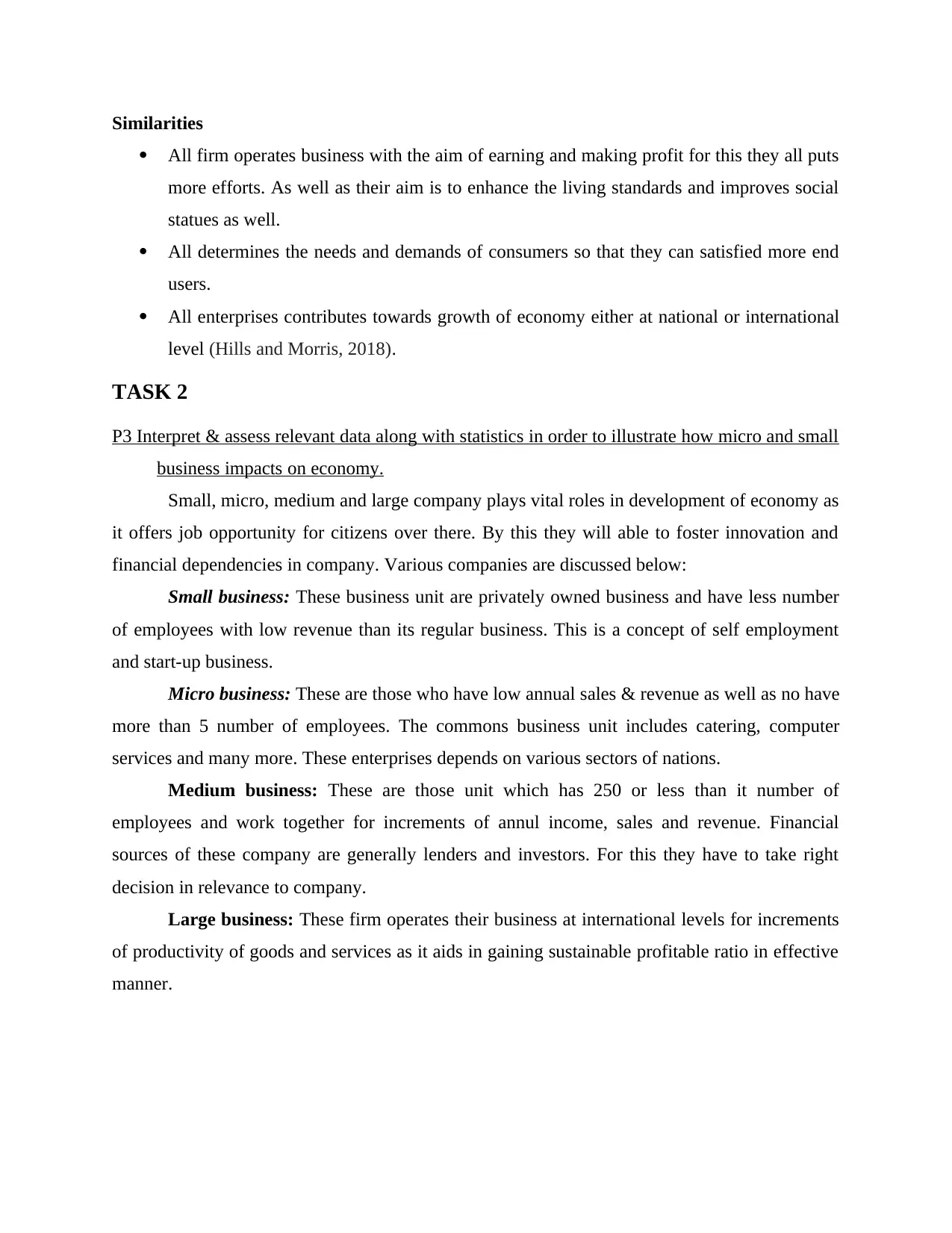
Similarities
All firm operates business with the aim of earning and making profit for this they all puts
more efforts. As well as their aim is to enhance the living standards and improves social
statues as well.
All determines the needs and demands of consumers so that they can satisfied more end
users.
All enterprises contributes towards growth of economy either at national or international
level (Hills and Morris, 2018).
TASK 2
P3 Interpret & assess relevant data along with statistics in order to illustrate how micro and small
business impacts on economy.
Small, micro, medium and large company plays vital roles in development of economy as
it offers job opportunity for citizens over there. By this they will able to foster innovation and
financial dependencies in company. Various companies are discussed below:
Small business: These business unit are privately owned business and have less number
of employees with low revenue than its regular business. This is a concept of self employment
and start-up business.
Micro business: These are those who have low annual sales & revenue as well as no have
more than 5 number of employees. The commons business unit includes catering, computer
services and many more. These enterprises depends on various sectors of nations.
Medium business: These are those unit which has 250 or less than it number of
employees and work together for increments of annul income, sales and revenue. Financial
sources of these company are generally lenders and investors. For this they have to take right
decision in relevance to company.
Large business: These firm operates their business at international levels for increments
of productivity of goods and services as it aids in gaining sustainable profitable ratio in effective
manner.
All firm operates business with the aim of earning and making profit for this they all puts
more efforts. As well as their aim is to enhance the living standards and improves social
statues as well.
All determines the needs and demands of consumers so that they can satisfied more end
users.
All enterprises contributes towards growth of economy either at national or international
level (Hills and Morris, 2018).
TASK 2
P3 Interpret & assess relevant data along with statistics in order to illustrate how micro and small
business impacts on economy.
Small, micro, medium and large company plays vital roles in development of economy as
it offers job opportunity for citizens over there. By this they will able to foster innovation and
financial dependencies in company. Various companies are discussed below:
Small business: These business unit are privately owned business and have less number
of employees with low revenue than its regular business. This is a concept of self employment
and start-up business.
Micro business: These are those who have low annual sales & revenue as well as no have
more than 5 number of employees. The commons business unit includes catering, computer
services and many more. These enterprises depends on various sectors of nations.
Medium business: These are those unit which has 250 or less than it number of
employees and work together for increments of annul income, sales and revenue. Financial
sources of these company are generally lenders and investors. For this they have to take right
decision in relevance to company.
Large business: These firm operates their business at international levels for increments
of productivity of goods and services as it aids in gaining sustainable profitable ratio in effective
manner.
⊘ This is a preview!⊘
Do you want full access?
Subscribe today to unlock all pages.

Trusted by 1+ million students worldwide
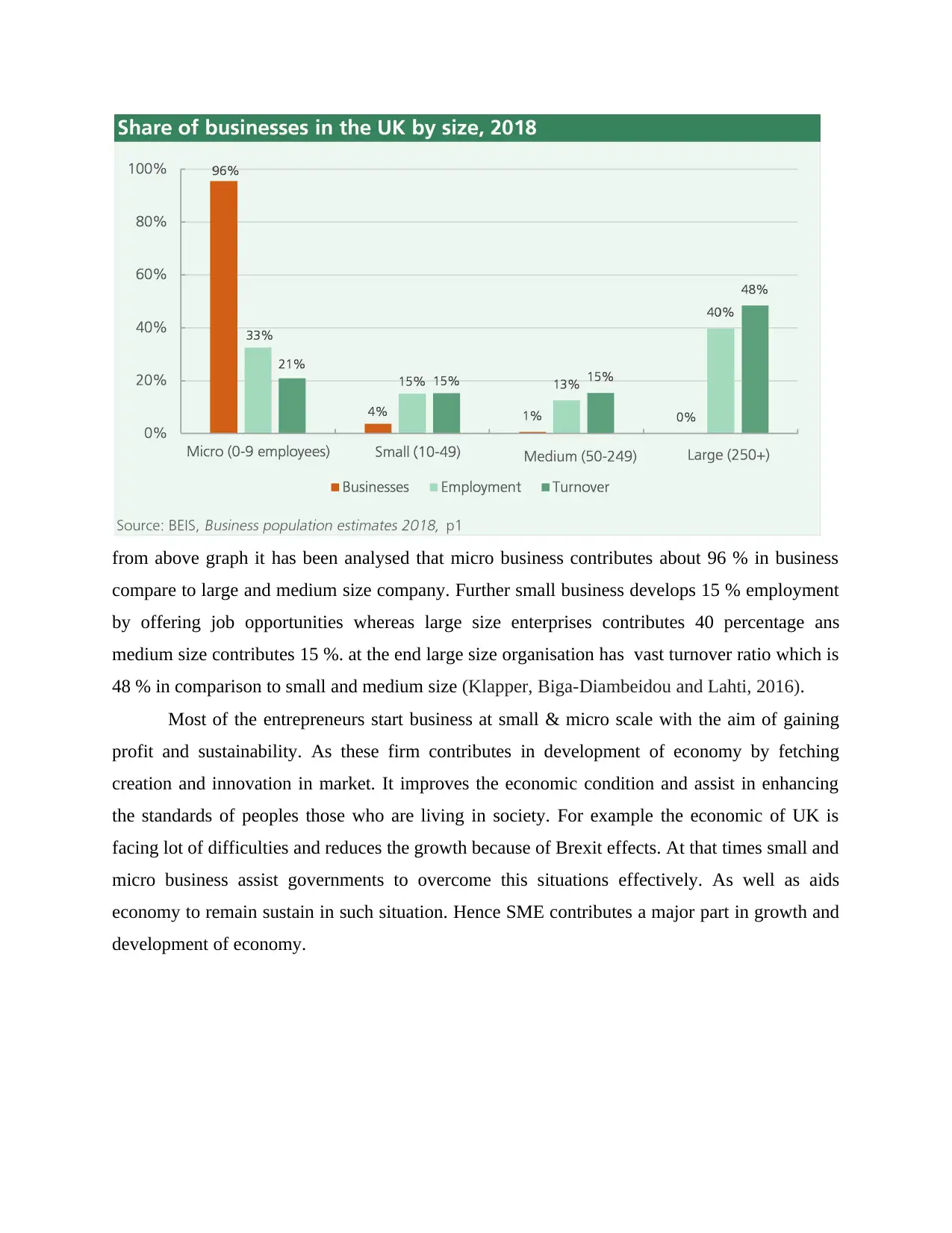
from above graph it has been analysed that micro business contributes about 96 % in business
compare to large and medium size company. Further small business develops 15 % employment
by offering job opportunities whereas large size enterprises contributes 40 percentage ans
medium size contributes 15 %. at the end large size organisation has vast turnover ratio which is
48 % in comparison to small and medium size (Klapper, Biga-Diambeidou and Lahti, 2016).
Most of the entrepreneurs start business at small & micro scale with the aim of gaining
profit and sustainability. As these firm contributes in development of economy by fetching
creation and innovation in market. It improves the economic condition and assist in enhancing
the standards of peoples those who are living in society. For example the economic of UK is
facing lot of difficulties and reduces the growth because of Brexit effects. At that times small and
micro business assist governments to overcome this situations effectively. As well as aids
economy to remain sustain in such situation. Hence SME contributes a major part in growth and
development of economy.
compare to large and medium size company. Further small business develops 15 % employment
by offering job opportunities whereas large size enterprises contributes 40 percentage ans
medium size contributes 15 %. at the end large size organisation has vast turnover ratio which is
48 % in comparison to small and medium size (Klapper, Biga-Diambeidou and Lahti, 2016).
Most of the entrepreneurs start business at small & micro scale with the aim of gaining
profit and sustainability. As these firm contributes in development of economy by fetching
creation and innovation in market. It improves the economic condition and assist in enhancing
the standards of peoples those who are living in society. For example the economic of UK is
facing lot of difficulties and reduces the growth because of Brexit effects. At that times small and
micro business assist governments to overcome this situations effectively. As well as aids
economy to remain sustain in such situation. Hence SME contributes a major part in growth and
development of economy.
Paraphrase This Document
Need a fresh take? Get an instant paraphrase of this document with our AI Paraphraser
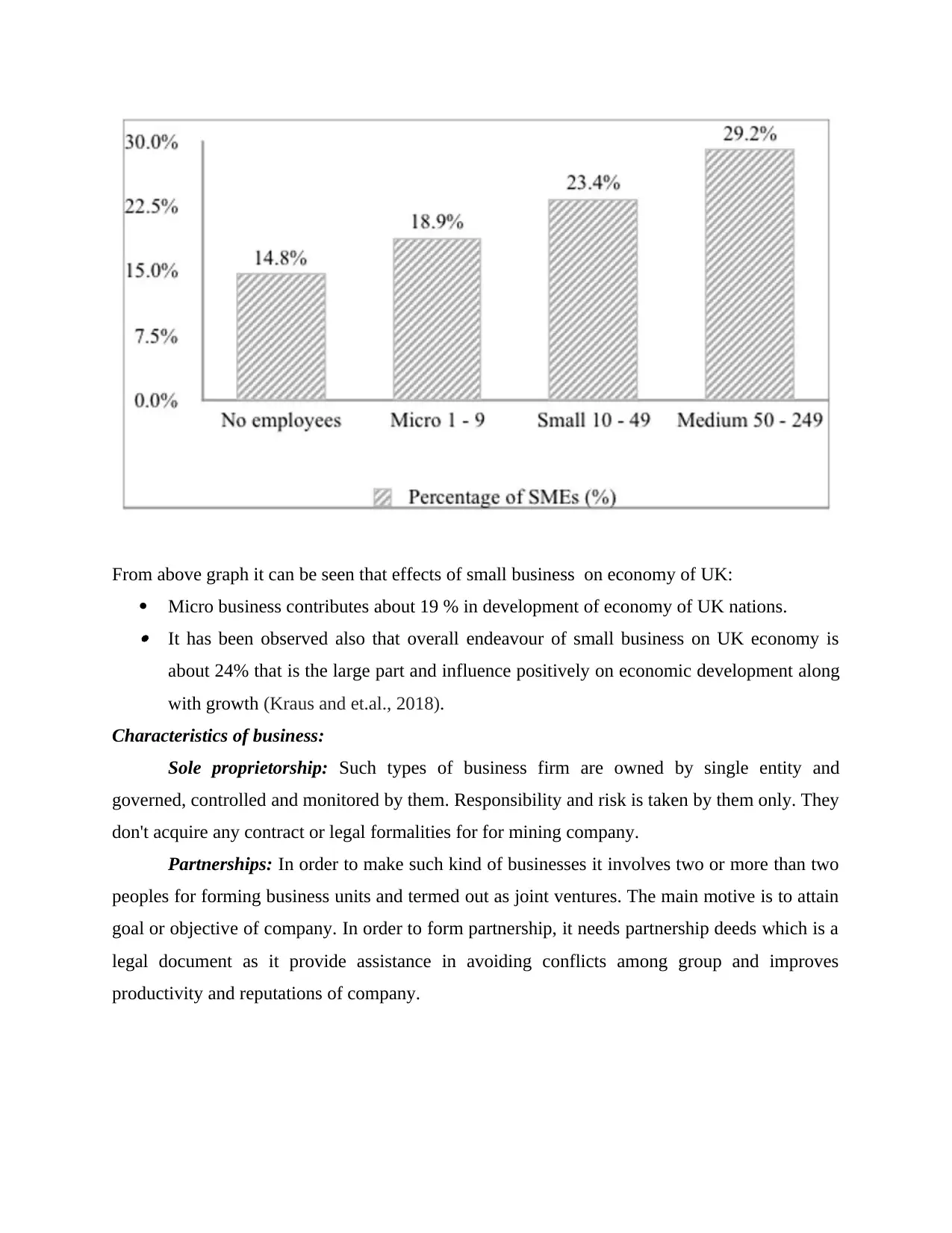
From above graph it can be seen that effects of small business on economy of UK:
Micro business contributes about 19 % in development of economy of UK nations. It has been observed also that overall endeavour of small business on UK economy is
about 24% that is the large part and influence positively on economic development along
with growth (Kraus and et.al., 2018).
Characteristics of business:
Sole proprietorship: Such types of business firm are owned by single entity and
governed, controlled and monitored by them. Responsibility and risk is taken by them only. They
don't acquire any contract or legal formalities for for mining company.
Partnerships: In order to make such kind of businesses it involves two or more than two
peoples for forming business units and termed out as joint ventures. The main motive is to attain
goal or objective of company. In order to form partnership, it needs partnership deeds which is a
legal document as it provide assistance in avoiding conflicts among group and improves
productivity and reputations of company.
Micro business contributes about 19 % in development of economy of UK nations. It has been observed also that overall endeavour of small business on UK economy is
about 24% that is the large part and influence positively on economic development along
with growth (Kraus and et.al., 2018).
Characteristics of business:
Sole proprietorship: Such types of business firm are owned by single entity and
governed, controlled and monitored by them. Responsibility and risk is taken by them only. They
don't acquire any contract or legal formalities for for mining company.
Partnerships: In order to make such kind of businesses it involves two or more than two
peoples for forming business units and termed out as joint ventures. The main motive is to attain
goal or objective of company. In order to form partnership, it needs partnership deeds which is a
legal document as it provide assistance in avoiding conflicts among group and improves
productivity and reputations of company.
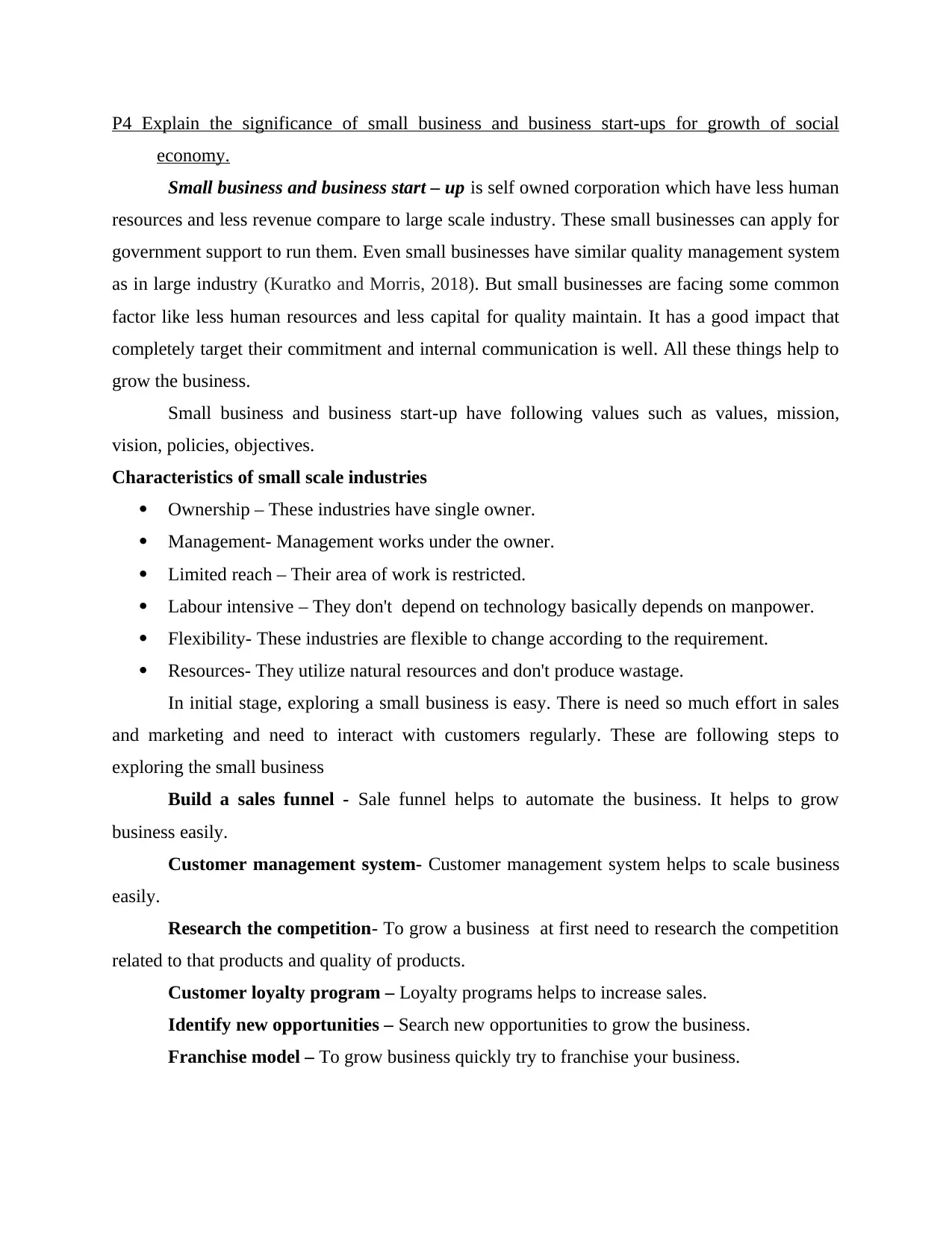
P4 Explain the significance of small business and business start-ups for growth of social
economy.
Small business and business start – up is self owned corporation which have less human
resources and less revenue compare to large scale industry. These small businesses can apply for
government support to run them. Even small businesses have similar quality management system
as in large industry (Kuratko and Morris, 2018). But small businesses are facing some common
factor like less human resources and less capital for quality maintain. It has a good impact that
completely target their commitment and internal communication is well. All these things help to
grow the business.
Small business and business start-up have following values such as values, mission,
vision, policies, objectives.
Characteristics of small scale industries
Ownership – These industries have single owner.
Management- Management works under the owner.
Limited reach – Their area of work is restricted.
Labour intensive – They don't depend on technology basically depends on manpower.
Flexibility- These industries are flexible to change according to the requirement.
Resources- They utilize natural resources and don't produce wastage.
In initial stage, exploring a small business is easy. There is need so much effort in sales
and marketing and need to interact with customers regularly. These are following steps to
exploring the small business
Build a sales funnel - Sale funnel helps to automate the business. It helps to grow
business easily.
Customer management system- Customer management system helps to scale business
easily.
Research the competition- To grow a business at first need to research the competition
related to that products and quality of products.
Customer loyalty program – Loyalty programs helps to increase sales.
Identify new opportunities – Search new opportunities to grow the business.
Franchise model – To grow business quickly try to franchise your business.
economy.
Small business and business start – up is self owned corporation which have less human
resources and less revenue compare to large scale industry. These small businesses can apply for
government support to run them. Even small businesses have similar quality management system
as in large industry (Kuratko and Morris, 2018). But small businesses are facing some common
factor like less human resources and less capital for quality maintain. It has a good impact that
completely target their commitment and internal communication is well. All these things help to
grow the business.
Small business and business start-up have following values such as values, mission,
vision, policies, objectives.
Characteristics of small scale industries
Ownership – These industries have single owner.
Management- Management works under the owner.
Limited reach – Their area of work is restricted.
Labour intensive – They don't depend on technology basically depends on manpower.
Flexibility- These industries are flexible to change according to the requirement.
Resources- They utilize natural resources and don't produce wastage.
In initial stage, exploring a small business is easy. There is need so much effort in sales
and marketing and need to interact with customers regularly. These are following steps to
exploring the small business
Build a sales funnel - Sale funnel helps to automate the business. It helps to grow
business easily.
Customer management system- Customer management system helps to scale business
easily.
Research the competition- To grow a business at first need to research the competition
related to that products and quality of products.
Customer loyalty program – Loyalty programs helps to increase sales.
Identify new opportunities – Search new opportunities to grow the business.
Franchise model – To grow business quickly try to franchise your business.
⊘ This is a preview!⊘
Do you want full access?
Subscribe today to unlock all pages.

Trusted by 1+ million students worldwide
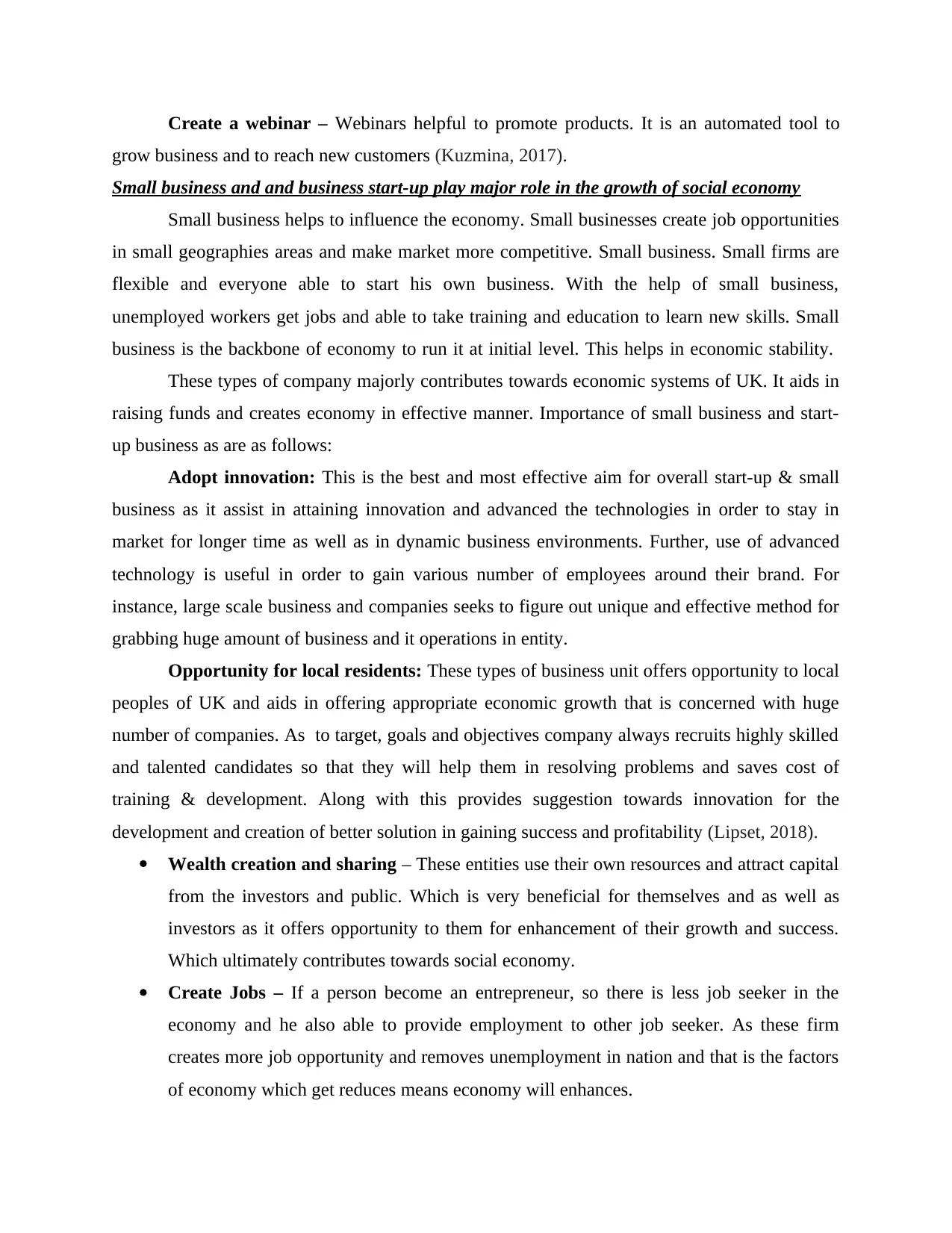
Create a webinar – Webinars helpful to promote products. It is an automated tool to
grow business and to reach new customers (Kuzmina, 2017).
Small business and and business start-up play major role in the growth of social economy
Small business helps to influence the economy. Small businesses create job opportunities
in small geographies areas and make market more competitive. Small business. Small firms are
flexible and everyone able to start his own business. With the help of small business,
unemployed workers get jobs and able to take training and education to learn new skills. Small
business is the backbone of economy to run it at initial level. This helps in economic stability.
These types of company majorly contributes towards economic systems of UK. It aids in
raising funds and creates economy in effective manner. Importance of small business and start-
up business as are as follows:
Adopt innovation: This is the best and most effective aim for overall start-up & small
business as it assist in attaining innovation and advanced the technologies in order to stay in
market for longer time as well as in dynamic business environments. Further, use of advanced
technology is useful in order to gain various number of employees around their brand. For
instance, large scale business and companies seeks to figure out unique and effective method for
grabbing huge amount of business and it operations in entity.
Opportunity for local residents: These types of business unit offers opportunity to local
peoples of UK and aids in offering appropriate economic growth that is concerned with huge
number of companies. As to target, goals and objectives company always recruits highly skilled
and talented candidates so that they will help them in resolving problems and saves cost of
training & development. Along with this provides suggestion towards innovation for the
development and creation of better solution in gaining success and profitability (Lipset, 2018).
Wealth creation and sharing – These entities use their own resources and attract capital
from the investors and public. Which is very beneficial for themselves and as well as
investors as it offers opportunity to them for enhancement of their growth and success.
Which ultimately contributes towards social economy.
Create Jobs – If a person become an entrepreneur, so there is less job seeker in the
economy and he also able to provide employment to other job seeker. As these firm
creates more job opportunity and removes unemployment in nation and that is the factors
of economy which get reduces means economy will enhances.
grow business and to reach new customers (Kuzmina, 2017).
Small business and and business start-up play major role in the growth of social economy
Small business helps to influence the economy. Small businesses create job opportunities
in small geographies areas and make market more competitive. Small business. Small firms are
flexible and everyone able to start his own business. With the help of small business,
unemployed workers get jobs and able to take training and education to learn new skills. Small
business is the backbone of economy to run it at initial level. This helps in economic stability.
These types of company majorly contributes towards economic systems of UK. It aids in
raising funds and creates economy in effective manner. Importance of small business and start-
up business as are as follows:
Adopt innovation: This is the best and most effective aim for overall start-up & small
business as it assist in attaining innovation and advanced the technologies in order to stay in
market for longer time as well as in dynamic business environments. Further, use of advanced
technology is useful in order to gain various number of employees around their brand. For
instance, large scale business and companies seeks to figure out unique and effective method for
grabbing huge amount of business and it operations in entity.
Opportunity for local residents: These types of business unit offers opportunity to local
peoples of UK and aids in offering appropriate economic growth that is concerned with huge
number of companies. As to target, goals and objectives company always recruits highly skilled
and talented candidates so that they will help them in resolving problems and saves cost of
training & development. Along with this provides suggestion towards innovation for the
development and creation of better solution in gaining success and profitability (Lipset, 2018).
Wealth creation and sharing – These entities use their own resources and attract capital
from the investors and public. Which is very beneficial for themselves and as well as
investors as it offers opportunity to them for enhancement of their growth and success.
Which ultimately contributes towards social economy.
Create Jobs – If a person become an entrepreneur, so there is less job seeker in the
economy and he also able to provide employment to other job seeker. As these firm
creates more job opportunity and removes unemployment in nation and that is the factors
of economy which get reduces means economy will enhances.
Paraphrase This Document
Need a fresh take? Get an instant paraphrase of this document with our AI Paraphraser
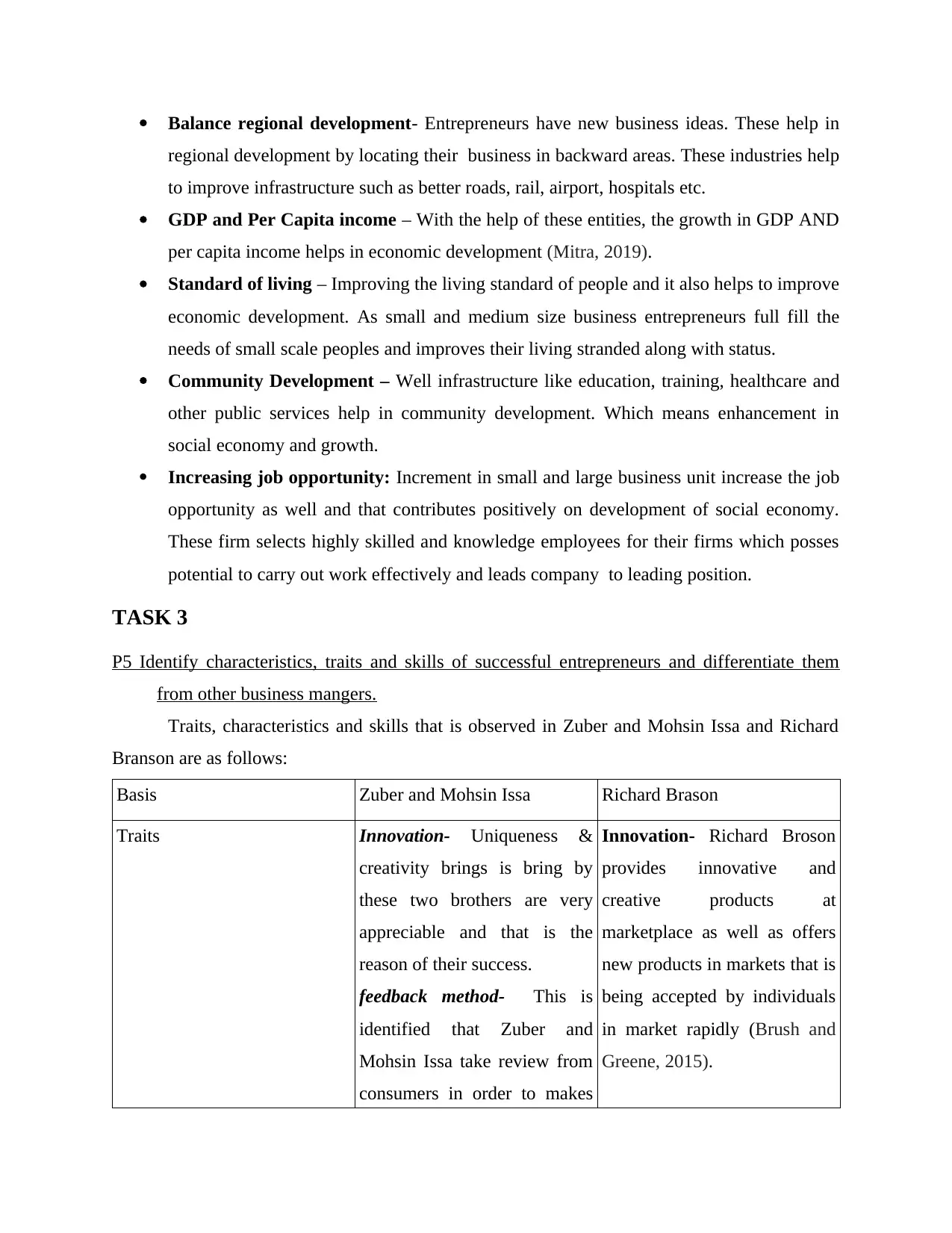
Balance regional development- Entrepreneurs have new business ideas. These help in
regional development by locating their business in backward areas. These industries help
to improve infrastructure such as better roads, rail, airport, hospitals etc.
GDP and Per Capita income – With the help of these entities, the growth in GDP AND
per capita income helps in economic development (Mitra, 2019).
Standard of living – Improving the living standard of people and it also helps to improve
economic development. As small and medium size business entrepreneurs full fill the
needs of small scale peoples and improves their living stranded along with status.
Community Development – Well infrastructure like education, training, healthcare and
other public services help in community development. Which means enhancement in
social economy and growth.
Increasing job opportunity: Increment in small and large business unit increase the job
opportunity as well and that contributes positively on development of social economy.
These firm selects highly skilled and knowledge employees for their firms which posses
potential to carry out work effectively and leads company to leading position.
TASK 3
P5 Identify characteristics, traits and skills of successful entrepreneurs and differentiate them
from other business mangers.
Traits, characteristics and skills that is observed in Zuber and Mohsin Issa and Richard
Branson are as follows:
Basis Zuber and Mohsin Issa Richard Brason
Traits Innovation- Uniqueness &
creativity brings is bring by
these two brothers are very
appreciable and that is the
reason of their success.
feedback method- This is
identified that Zuber and
Mohsin Issa take review from
consumers in order to makes
Innovation- Richard Broson
provides innovative and
creative products at
marketplace as well as offers
new products in markets that is
being accepted by individuals
in market rapidly (Brush and
Greene, 2015).
regional development by locating their business in backward areas. These industries help
to improve infrastructure such as better roads, rail, airport, hospitals etc.
GDP and Per Capita income – With the help of these entities, the growth in GDP AND
per capita income helps in economic development (Mitra, 2019).
Standard of living – Improving the living standard of people and it also helps to improve
economic development. As small and medium size business entrepreneurs full fill the
needs of small scale peoples and improves their living stranded along with status.
Community Development – Well infrastructure like education, training, healthcare and
other public services help in community development. Which means enhancement in
social economy and growth.
Increasing job opportunity: Increment in small and large business unit increase the job
opportunity as well and that contributes positively on development of social economy.
These firm selects highly skilled and knowledge employees for their firms which posses
potential to carry out work effectively and leads company to leading position.
TASK 3
P5 Identify characteristics, traits and skills of successful entrepreneurs and differentiate them
from other business mangers.
Traits, characteristics and skills that is observed in Zuber and Mohsin Issa and Richard
Branson are as follows:
Basis Zuber and Mohsin Issa Richard Brason
Traits Innovation- Uniqueness &
creativity brings is bring by
these two brothers are very
appreciable and that is the
reason of their success.
feedback method- This is
identified that Zuber and
Mohsin Issa take review from
consumers in order to makes
Innovation- Richard Broson
provides innovative and
creative products at
marketplace as well as offers
new products in markets that is
being accepted by individuals
in market rapidly (Brush and
Greene, 2015).
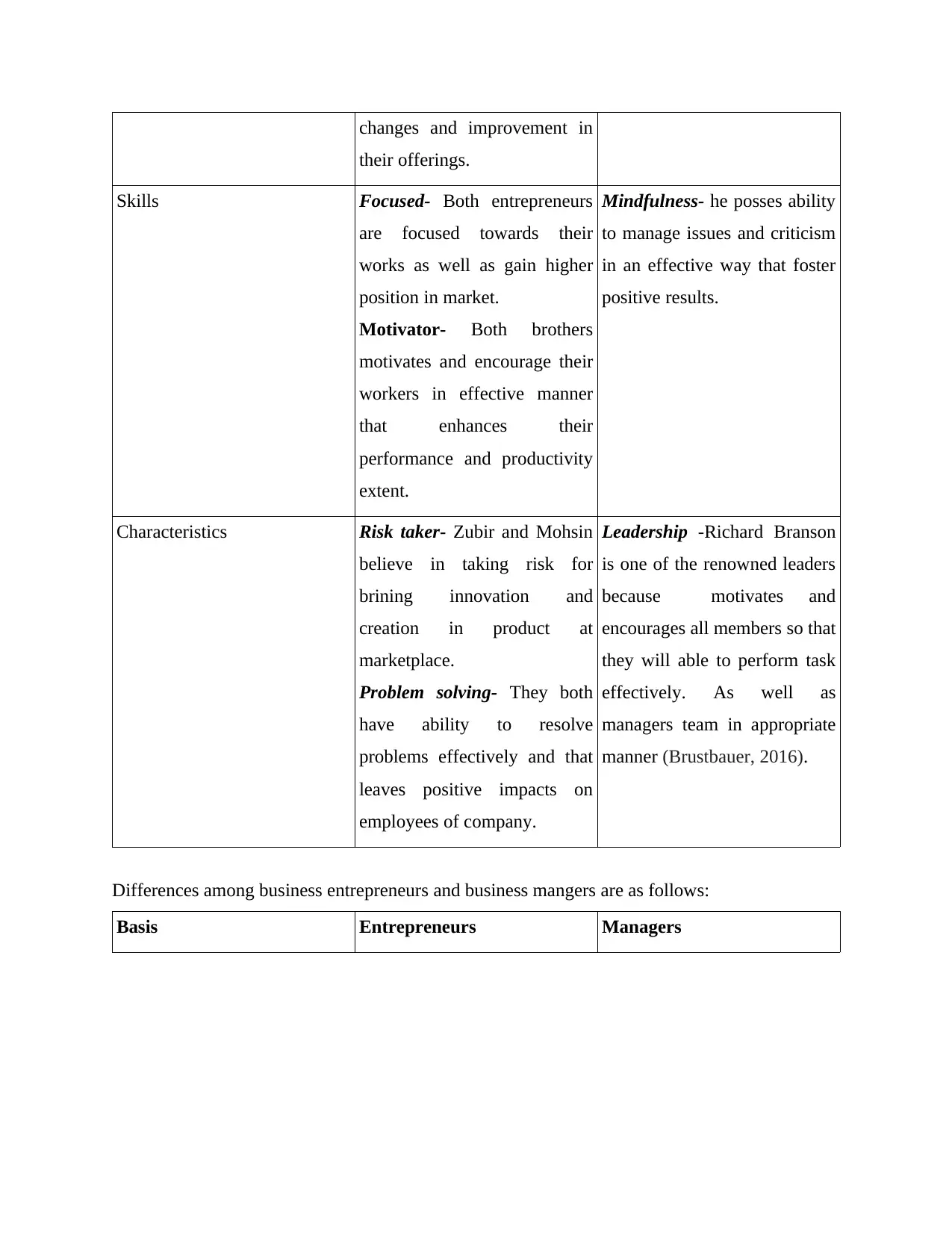
changes and improvement in
their offerings.
Skills Focused- Both entrepreneurs
are focused towards their
works as well as gain higher
position in market.
Motivator- Both brothers
motivates and encourage their
workers in effective manner
that enhances their
performance and productivity
extent.
Mindfulness- he posses ability
to manage issues and criticism
in an effective way that foster
positive results.
Characteristics Risk taker- Zubir and Mohsin
believe in taking risk for
brining innovation and
creation in product at
marketplace.
Problem solving- They both
have ability to resolve
problems effectively and that
leaves positive impacts on
employees of company.
Leadership -Richard Branson
is one of the renowned leaders
because motivates and
encourages all members so that
they will able to perform task
effectively. As well as
managers team in appropriate
manner (Brustbauer, 2016).
Differences among business entrepreneurs and business mangers are as follows:
Basis Entrepreneurs Managers
their offerings.
Skills Focused- Both entrepreneurs
are focused towards their
works as well as gain higher
position in market.
Motivator- Both brothers
motivates and encourage their
workers in effective manner
that enhances their
performance and productivity
extent.
Mindfulness- he posses ability
to manage issues and criticism
in an effective way that foster
positive results.
Characteristics Risk taker- Zubir and Mohsin
believe in taking risk for
brining innovation and
creation in product at
marketplace.
Problem solving- They both
have ability to resolve
problems effectively and that
leaves positive impacts on
employees of company.
Leadership -Richard Branson
is one of the renowned leaders
because motivates and
encourages all members so that
they will able to perform task
effectively. As well as
managers team in appropriate
manner (Brustbauer, 2016).
Differences among business entrepreneurs and business mangers are as follows:
Basis Entrepreneurs Managers
⊘ This is a preview!⊘
Do you want full access?
Subscribe today to unlock all pages.

Trusted by 1+ million students worldwide
1 out of 16
Related Documents
Your All-in-One AI-Powered Toolkit for Academic Success.
+13062052269
info@desklib.com
Available 24*7 on WhatsApp / Email
![[object Object]](/_next/static/media/star-bottom.7253800d.svg)
Unlock your academic potential
Copyright © 2020–2025 A2Z Services. All Rights Reserved. Developed and managed by ZUCOL.





